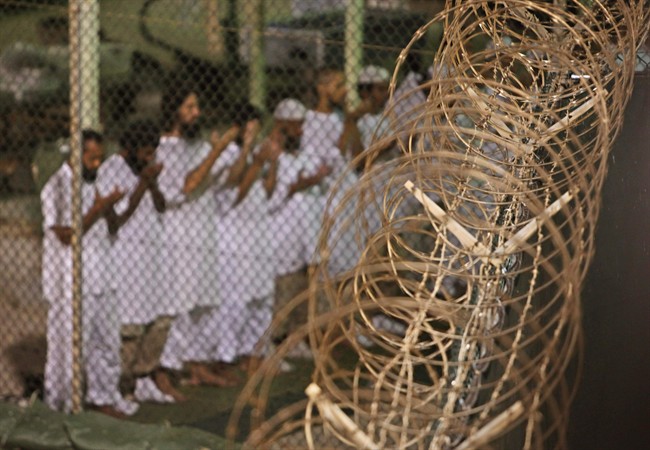MIAMI – Ten prisoners from Yemen who were held at Guantanamo Bay, Cuba have been released and sent to the Middle Eastern nation of Oman for resettlement, officials said Thursday, portraying it as a significant milestone in the long-stalled effort to shutter the offshore detention centre.

The release, among the largest on a single day under President Barack Obama, puts the prison population below 100 for the first time since shortly after it opened in January 2002 to hold men suspected of links to al-Qaida and the Taliban. There are now 93 still held.
Lee Wolosky, the State Department’s special envoy for Guantanamo Closure, said the U.S. expects to transfer the remaining prisoners who are cleared to leave, about a third of the total, by summer.
At its peak in 2003, Guantanamo held nearly 680 prisoners and about 245 when Obama came into office, pledging to close it as a symbol of overreach in the war against terrorism and a needless propaganda symbol for enemies of the United States.
Defence Secretary Ash Carter announced the release of the Yemenis at a change of command ceremony in Miami at U.S. Southern Command, which oversees Guantanamo. He said the administration will work with Congress, where many want to keep the prison open, to find a secure location inside the United States to hold those who can’t be freed.
“Not everyone in Gitmo can be safely transferred to another country, so we need an alternative,” Carter said, using a common abbreviated name for the base on the southeastern edge of Cuba.
The 10 men who left Guantanamo late Tuesday were among several dozen men from Yemen who could not be sent back to their homeland, which is embroiled in a civil war. All were deemed low-level enemy combatants and cleared for transfer since at least 2010. The prisoners included one who was 17 when captured and another who the government conceded had only briefly served as a Taliban medic. None were ever charged.
David Remes, a lawyer for three of the men, said two, Mukhtar al Warafi and Saeed Hatim, got down on their knees and prayed in December when they learned they would be released. The third, Fahmi Ahmed, at first wasn’t sure whether to believe it and wanted proof when he got word this week.
“The men learned to lower their expectations and indeed to have no expectations so that everything good is a surprise,” Remes said in a phone interview from the base. “But this was a joyful surprise.”
Sen. Kelly Ayotte, a prominent advocate for keeping the detention centre open, criticized the decision to transfer the men to Oman, which borders their homeland along the Arabian Sea. Congress has prohibited the transfer of any Guantanamo detainees to Yemen, as well as to the United States.
“Any Obama administration decision to transfer a large number of Yemeni detainees from Guantanamo to Oman would represent a thinly veiled attempt to undercut the will of Congress and would further endanger the American people,” Ayotte said.
Carter said the decision to resettle them in Oman was made only after a thorough security review and Ian Moss, chief of staff to the State Department’s special envoy, said it would be wrong to continue holding men just because of their Yemeni nationality.
“If we as a government have determined that an individual can and should be transferred from Guantanamo responsibly and we’ve identified an appropriate resettlement location, like Oman, then we will transfer them,” Moss said.
Oman has now taken a total of 20 prisoners for resettlement, including 10 last year. Wolosky thanked their government for agreeing to take them. “Sustained diplomatic engagement led us to this important milestone. ”
Advocates for closing the base said they were cautiously optimistic this latest transfer reflected real momentum to close the prison. Brian Foster, whose firm represents 14 Yemenis, including two released this week, said he was at least relieved for those who finally made it out.
“It’s long past time,” Foster said. “It would have been better for everybody if they had done this a whole lot sooner but better late than never I guess.”



Comments